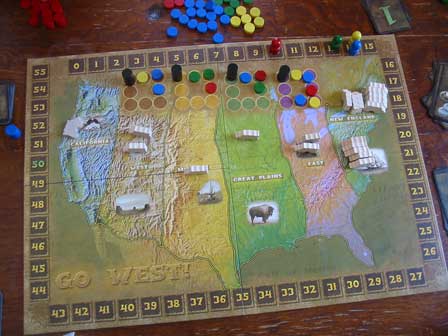Go West comes from designer Leo Colovini and Phalanx Games, who are producing an interesting variety of games these days. The chunky box shows a wagon train wending a dusty path past buttes in the American West. This nicely sets the scene for the game. The board shows the continental USA, divided north-south into regions, decorated with sepia photos to give a period atmosphere. The central regions have tracks to show players’ influence in them. The nice wooden pieces representing ‘prairie schooner’ wagons start the game in “New England”, the easternmost region, and will be moved west across the board. The 3-4 players get 30 wooden discs in their colour, a scoring pawn and a ‘double-turn’ marker. The discs are used both as money and to show influence over a region on the board. Players also start with a set of scoring cards and a hand of action cards. Each turn they can play or discard an action card or play their next scoring card. Playing a scoring card means that points are scored for the central regions. This costs the player discs – with later cards costing more. Scoring points is, of course, the way to win the game. The number of points available in each region is the number of wagons there. Starting with whoever has most influence, the points are shared out (there is the occasional opportunity for clever tactics here). So, to boost their score, players need to get their discs on the board as influence and move the wagons along. Both of these are done by playing action cards. Playing an action card is the usual action each turn. First it must be paid for by putting discs into the bank. Second, the player adds one or two discs to one or two regions, depending on the card. These go onto empty spaces on the appropriate track. Once the track is full, a marker moves round, removing the ‘oldest’ disc to make space for the new disc(s). Third, the player moves wagons westward. Generally, the more discs and moves on a card, the more it costs to play. My experience is that whoever gets the most discs on the board is likely to win the game. 
The third option each turn is to discard an action card. This allows the player to retrieve some of their discs from the bank. Spending discs to play action and scoring cards and playing discs as influence all eat into players’ starting stock, quickly forcing them to get some discs back. Tactically, however, taking discs uses up a turn, and can allow other players to gain the initiative. As everybody is likely to get some points when the regions are scored, players jockey for the best scoring position. A scoring round only happens when someone can see that they will score more points than anybody else. This is why the ‘double-turn’ pawn is important. Playing this enables a player to take two turns in succession. So they can play an action card to gain a favourable position and then score those points. Once played, ‘double-turn’ pawns are set aside and don’t come back until everybody has played theirs. My problem is how long turns take. Each turn I tot up the points everybody would score and evaluate my cards to see how each of them could change the scores. Then I can decide whether it’s worth using my double turn and scoring some points. If it isn’t, then I have to decide which card will best improve my position. Or whether to get discs back from the bank. All of which takes time and means the game moves pretty slowly. A game takes more than the 45 minutes shown on the box – and feels an awful lot longer. The game ends when a player reaches 50+ points – which has never happened in any of the games I’ve played. Or it ends once all the wagons have been moved out of the easternmost regions, when there’s an extra scoring round. The player with the most points wins. But I keep feeling that either I’ve missed something or there’s something missing from the game. While Go West works fine and has some clever tactical nuances, I just don’t find it fun. Go West was designed by Leo Colovini and is published
by Phalanx Games. It is a board game for 3-4 players and takes about 1 hour to
play. It is available in games shops in the UK. | Pevans |